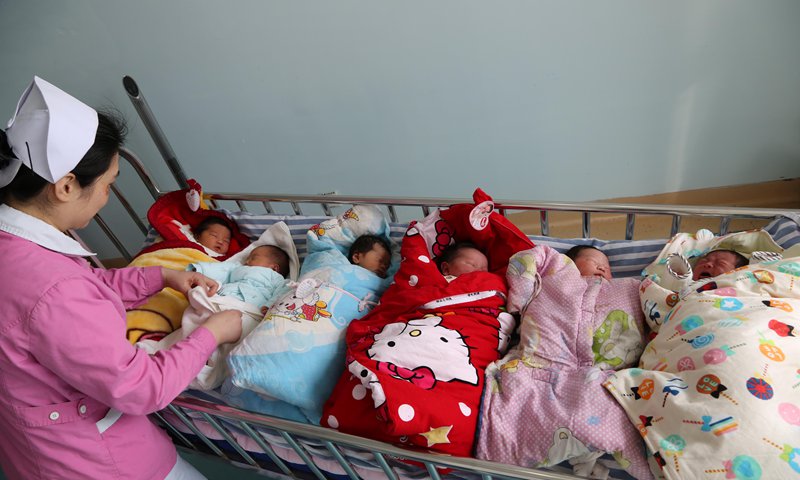
A nurse attends to newborn babies at a hospital in Xiangyang, Hubei Province. Photo: VCG
The relaxation of China's family planning policy to allow couples to have a third child has aroused heated discussions. Some young people said they have no will to give birth to the third child. We believe their reaction is within the anticipations of policymakers. After all, although the number of families with two children is gradually increasing, it's far from a common wish for couples of childbearing age to have two offspring. Giving birth to the third child is farther from many families. But it's shortsighted if people claim the new policy won't work based on those immediate reactions to it.
The biggest reason for low fertility intentions is that there are a lot of depopulation elements in today's society that have shaped people's lives, outlook of work and values. It's fair to say people's planning and consumption concepts in key aspects such as marriage, housing and children's education, and even the price system, are deeply influenced by society's depopulation elements. National policies are needed to promote gradual changes in these aspects.
For instance, getting married late is popular in big cities, so couples often have only one or two children. This also leads to excessive investment in education. Housing prices are related to the affordability of urban households. The number of family members shouldn't become the biggest difficulty preventing a family purchasing a house. The government agencies in charge of land use should be able to prevent the housing issue from becoming the biggest obstacle to family planning policy adjustments.
College students seldom choose to give birth before their graduation. As the family planning policy changes, this situation is likely to change. Child care centers have become rare in big cities, and it is common to see older people or nannies take care of babies. Child care centers are likely to return to big cities or big institutions.
Let's see another example. As women who give birth face career ceilings, relevant laws that protect women's rights will be made. We have great expectations for it.
A society in which each family has only one child functions differently from one in which most families have two or three children. We believe both government and market forces will promote the restructuring of our social system related to giving birth and raising children. Some changes will be led by the government, and some by the market. It is too assertive to believe that Chinese society is as rigid as always having one child.
The public investment into encouraging families to have more children has not started yet. China's welfare system is bound to benefit families with more children. As China's economic strength keeps growing, local governments will have the ability to strengthen comprehensive social development that facilitates the policy of encouraging couples to have a third child and implement the guidelines by the political bureau of the CPC Central Committee.
In short, China is getting more and more wealthy, and after gradual restructuring, our society will not be "too poor" to have more children. In addition, although economic development and improvement in education level may reduce the willingness of people to have more children, China has its own traditional culture to support the policy and this problem should not become more serious than that in the West. Facts have repeatedly proven that China's capacity for macro-control is the strongest in the world, and the adjustment of China's family planning policy will produce positive results in the long run. Such expectations are grounded in history and reality.
When the second-child policy was adopted, many people were pessimistic about its effect. However, not only has the seventh national population census provided clear data on the increase in the second-child fertility rate, but people see many families around them have a second child, which proves that changes are taking place. Some people questioned the data of the seventh national population census and claimed that the arrival of the third-child policy was a panic-driven sign of the failure of the second-child policy. This is an attempt to stir things up.
Population policy is long-term and future-oriented. China is good at adjusting its policy to solve different problems and make continuous progress. When we are getting better and better, the future will belong to this country and the Chinese nation.




